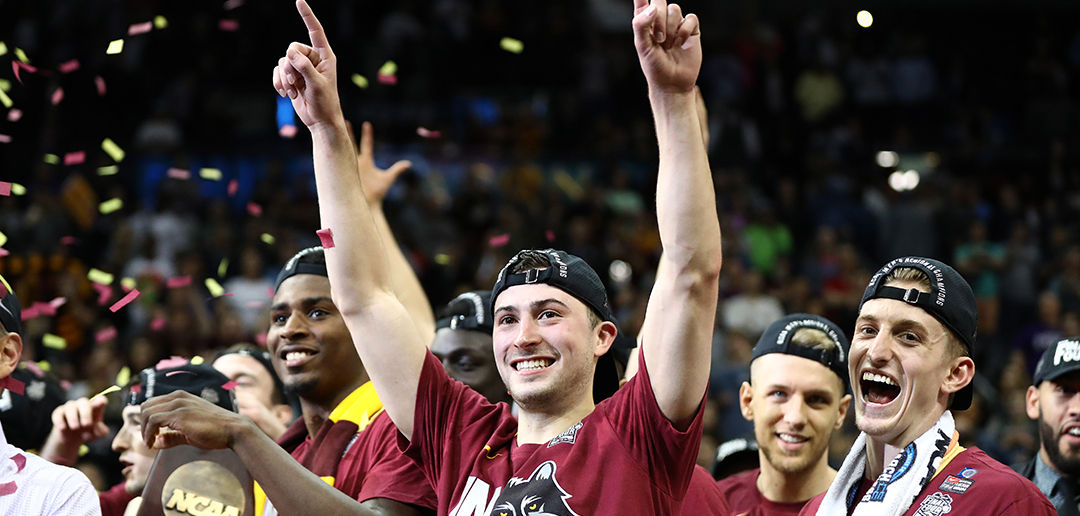The slipper still fits!"
Chances are, if you’ve watched college basketball highlight montages, you’ve heard Gus Johnson’s fervent and unmistakable voice bellow out this phrase.
At the time it applied to Gonzaga, who crashed the Elite Eight with a last-second tip-in over Florida. But it could just as easily apply to any unexpected visitor standing up to college basketball’s bluebloods this time of year.
The reference, of course, is to that old fairy tale Cinderella, a term that appears at the start of the college basketball season and continues into the madness of March.
Let’s be honest. Any fan of the wonderful, chaotic scramble that is the NCAA Men’s Basketball season loves to identify and attach themselves to whatever upstart will carry the Cinderella mantle that year.
We love an underdog story.
Does It Have to End?
Inevitably, along with the Cinderella reference comes the question asked by countless announcers over the years: “Is this when the clock will strike midnight?”
A particular team receives the Cinderella moniker because their success is so unexpected. Naturally, they aren’t expected to sustain it. And, much to our underdog-loving chagrin, most often they don’t. The stagecoach turns back into a pumpkin and the flavor of the month goes bland and vanilla.
The magic can only last so long.
Or can it?
A Transforming Reversal of Fortune
The closest biblical parallel to the Cinderella narrative, as sporting comparisons go, is that of David and Goliath. Goliath represents the supremely talented basketball powerhouse; David the upstart with a sling, a stone, a wing, and a prayer.
Just like Cinderella would never have been expected to garner the attention of the Prince, David would never—by human measurement—be expected to slay the giant.
Here’s the odd twist in the way we use these twin metaphors, though: David defeated Goliath. And in the end, Cinderella won the Prince’s hand.
Perhaps the reason we so love the yearly emergence of a Cinderella team is because our own lives are easily viewed through the lens of this fairy tale. We all fill the shoes of Cinderella, each in our own way.
Some are pounded into hopeless submission by life’s cruelties and setbacks.
Some attempt to play the comparison game and crumble under its pressure.
Some are laden with a guilt so heavy that they can’t fathom anyone choosing them and loving them.
Some simply carry around an innate sense that something is missing, or broken within them, but they can’t name exactly what.
The Bible says it simply: “There is no one righteous, not even one…for all have sinned and fall short of the glory of God.” (Romans 3:10, 23 NIV) Our spiritual state is actually worse than Cinderella’s physical one. Not only are we dirty, oppressed, and unnoticed, we’re actually deserving of that state.
Yet in this true story, God acts as both the Fairy Godmother and the good Prince.
“But because of his great love for us, God, who is rich in mercy, made us alive with Christ even when we were dead in transgressions.” (Ephesians 2:4-5 NIV)
Like the Fairy Godmother, God exchanges our filthy, sin-stained hearts with the exquisitely beautiful and righteous character of Christ. He makes us lovable and worthy by grace, received by us through faith.
And like the Prince, He fixes His eyes squarely on us and chooses us with love. So much so that He won’t rest until He’s found the one on whom the glass slipper fits. When he does—again by His grace through our responding faith—He ushers us into our happily ever after in His Kingdom.
All of our Cinderella stories can end this way. In fact, that’s God’s desire—for each of us to respond to His invitation to receive His grace and forgiveness, purchased by the death and resurrection of Jesus Christ.
As you watch the games this weekend and hear one of the dozens of inevitable Cinderella references, remember how the story truly ends. Time will only tell how it will end for your favorite Cinderella team, but—in Christ—you can be certain that your story will end in jubilation.














